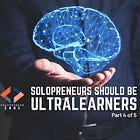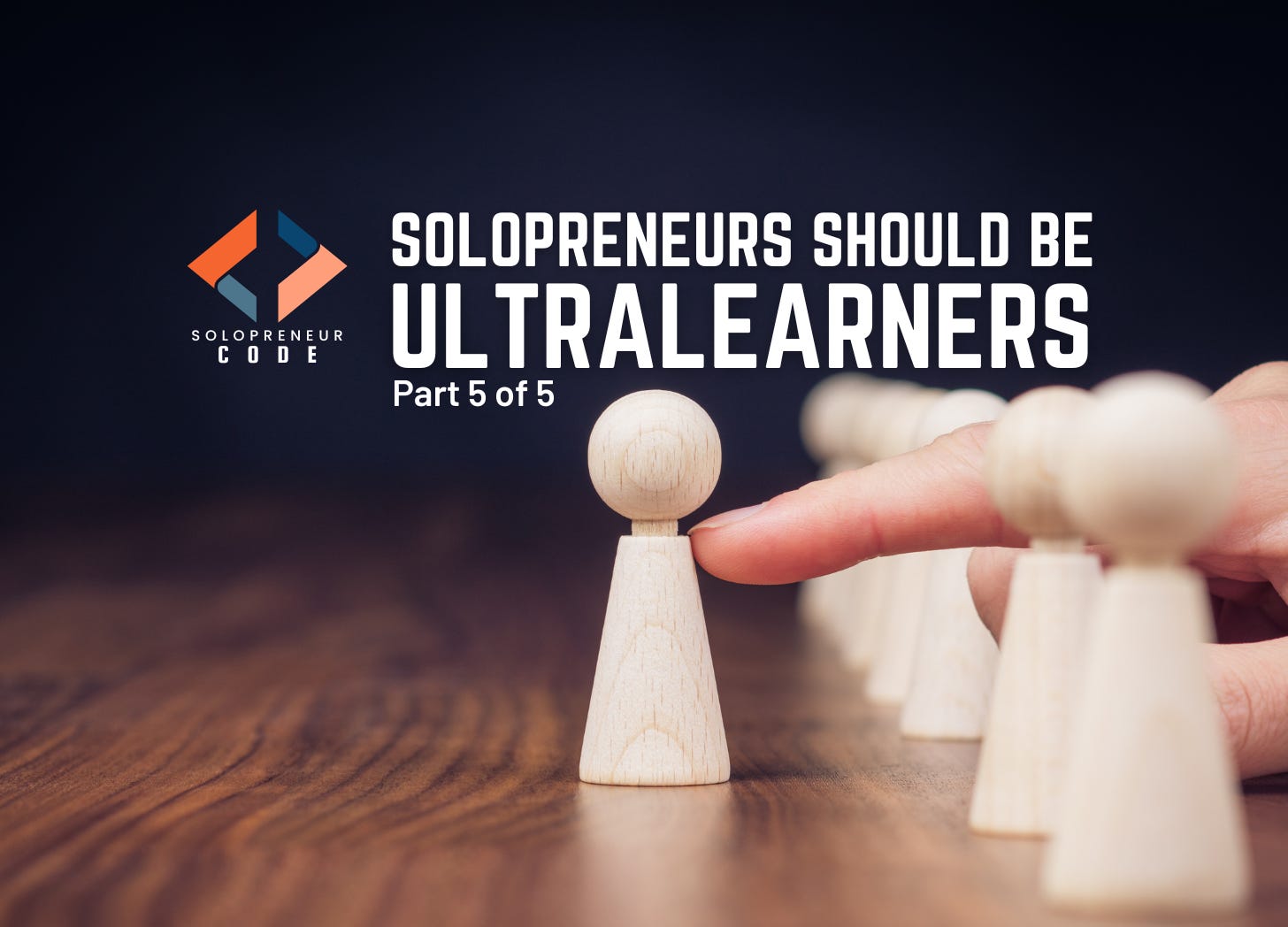Solopreneurs Should Be Ultralearners (Part 5 of 5)
Innovate and Improve: The Value of Experimentation
Welcome to the final installment of our Ultralearning series!
Ultralearning is a strategy for acquiring skills and knowledge that is both self-directed and intense. It emphasizes deep focus, deliberate practice, and real-world application. Unlike traditional learning methods that often rely on passive consumption of information, Ultralearning encourages active engagement and hands-on practice.
For entrepreneurs, solopreneurs and professionals, mastering the art of Ultralearning can be a game-changer. It enables you to stay competitive, adapt to new challenges, and continuously improve your skills. Whether you want to learn a new language, master a programming language, or improve your marketing skills, Ultralearning provides a framework to achieve your goals efficiently and effectively.
Over the past weeks, we’ve explored eight powerful principles that can supercharge your learning and professional growth. If you haven’t read that, do check it out here:
Today, we dive into the ninth principle: Experimentation.
Recap on the Newsletter Series
In this series, we will delve into the principles of Ultralearning, a self-directed, intense learning strategy developed by Scott H. Young. Each newsletter will explore multiple principles in detail, providing you with actionable insights and practical steps to implement these strategies in your own life.
Newsletter 1: Introduction, Principles (1) Metalearning and (2) Focus
Newsletter 5: Principles (9) Experimentation and Conclusion
By the end of this series, you’ll be armed with the tools to tackle complex subjects and acquire new skills faster than ever before.
Why Experimentation is Crucial for Learning and Growth
Experimentation is about stepping outside your comfort zone and trying new approaches to solve problems or learn skills.
It’s through experimentation that you can discover innovative solutions, refine your techniques, and achieve breakthroughs.
Fosters Innovation - By experimenting, you explore new ideas and methods that can lead to significant innovations and improvements in your work.
Accelerates Learning - Experimentation helps you learn more efficiently by allowing you to test hypotheses and see what works best in real-world scenarios.
Builds Resilience - Trying new things, even if they fail, builds resilience. It teaches you to adapt and persevere, crucial qualities for entrepreneurs and professionals.
How to Create a Safe Environment for Trying New Things
Creating a safe environment for experimentation is essential to foster creativity and innovation without the fear of failure.
Set Clear Objectives - Define what you aim to achieve with your experiments. Clear goals help you stay focused and measure success.
Start Small - Begin with small, low-risk experiments. This reduces the pressure and allows you to learn and iterate quickly.
Encourage Open Communication - Foster a culture where feedback is welcomed and shared openly. This helps you learn from your experiments and improve.
Embrace Failure - View failure as a learning opportunity rather than a setback. Every unsuccessful experiment teaches you something valuable.
Stories of Breakthroughs Achieved Through Experimentation
Thomas Edison - Edison’s development of the lightbulb involved countless experiments. Each failure brought him closer to a successful design, demonstrating the power of persistence and experimentation.
Google’s 20% Time - Google encourages employees to spend 20% of their time on projects they’re passionate about. This policy has led to innovations like Gmail and Google News.
Pixar’s Creative Process - Pixar’s filmmakers constantly experiment with new storytelling techniques and technologies, leading to groundbreaking films.
Tips for Incorporating Experimentation into Your Learning
Adopt a Scientific Mindset - Approach your learning like a scientist. Formulate hypotheses, conduct experiments, and analyse the results.
Keep a Learning Journal - Document your experiments, outcomes, and insights. This helps you track your progress and learn from each experience.
Iterate and Improve - Use the results of your experiments to refine your approach. Continuous iteration leads to gradual but significant improvements.
Collaborate with Others - Share your experiments and results with peers. Collaboration can provide new perspectives and ideas.
Overview of Ultralearning Principles
As we conclude our series, let’s recap the nine Ultralearning principles:
Meta-Learning: Understand how you learn best and plan your learning strategy.
Focus: Minimise distractions and maintain concentration on your learning tasks.
Directness: Learn by doing. Engage in real-world practice.
Drill: Isolate and practice the most challenging aspects of what you’re learning.
Retrieval: Practice recalling information to enhance long-term memory.
Feedback: Seek and use constructive feedback to improve continuously.
Retention: Use techniques like spaced repetition to retain knowledge over the long term.
Intuition: Develop a deep understanding and trust your instincts.
Experimentation: Innovate and improve through trial and error.
Additional Resources and Tools for Ongoing Self-Improvement
Books:
“Ultralearning” by Scott Young
“Peak: Secrets from the New Science of Expertise” by Anders Ericsson and Robert Pool
Online Courses:
Coursera, edX, and Udemy offer a wide range of courses to enhance your skills.
FREE online learning course: Learning How to Learn: Powerful mental tools to help you master tough subjects
Productivity Tools:
Anki for spaced repetition
Notion for organizing your learning projects, note-taking and reflection
Call to Action: Start Your Own Ultralearning Project
Now that you’ve learned the principles of Ultralearning, it’s time to put them into action.
Identify a skill or subject you’re passionate about and start your own ultralearning project.
Use the principles and tips we’ve discussed to guide you on this exciting journey.
Check out Scott Young’s MIT challenge!
https://www.scotthyoung.com/blog/myprojects/mit-challenge-2/
Thank you for joining us on this Ultralearning series.
We hope you’ve found it insightful and motivating.
Stay curious, stay driven, and keep learning!
"All life is an experiment. The more experiments you make the better."
- Ralph Waldo Emerson
Interesting Substacks I Read This Week:
The Fastest Way to Make Money with Your Newsletter in 2024 📧 by
, andMy 3D Strategy To Monetize My Substack: Products, Services & Community by
Subscription Shock: The #1 Mental Model To Understand The Future Of Paid Subscriptions by
Why Your Brain Thinks You're in a Horror Movie at Night by
Why You Need to Care About CLV (Customer Lifetime Value) by
10 Lessons Selling $10M of Digital Products by
Want To Be A Successful Writer? Do Cool Stuff First by
8 Things You Should Give up If You Want to Retire in the Next 5 Years by
Is Email Marketing Dead? - The Power of Newsletters Explained by
Cracking the growth equation in a one person business,
Anfernee
Like this post? Consider doing these 2 things:
"The Solopreneur Code" is targeted towards solo entrepreneurs, providing insights, tips, and strategies for success in running a business independently, share with your community if you think this is helpful for them.
Have a question? Comment below!









I recommend this series, if you want to stay ahead of the market or if you are learning a new skill.
I will go over this series today before l start the course am taking so that l take the best out of it. Recommend for entrepreneurs.